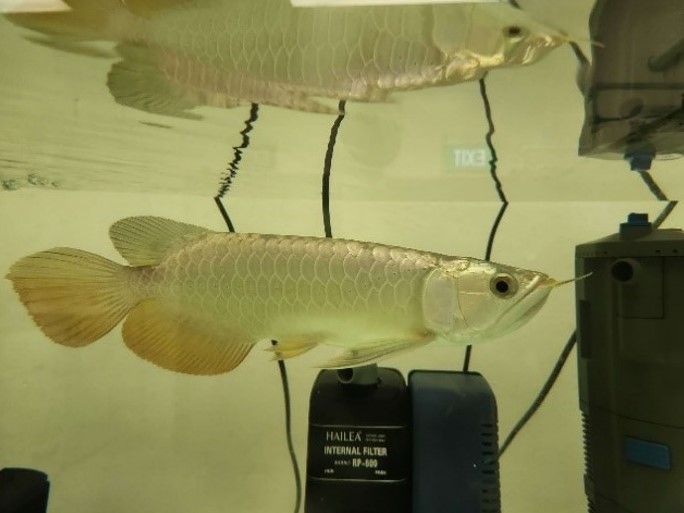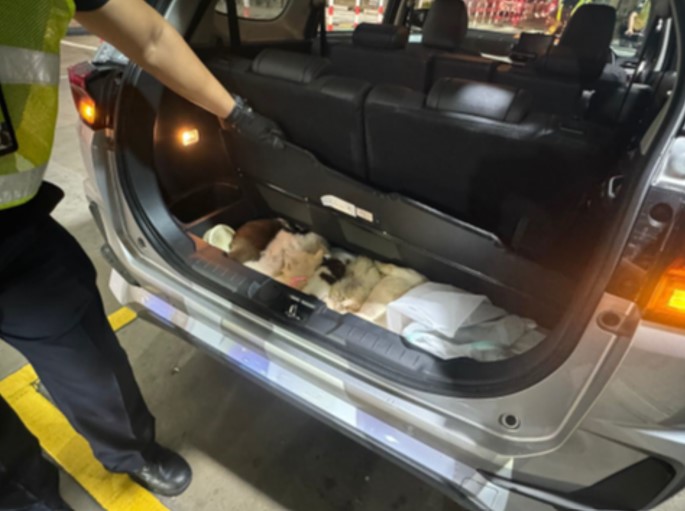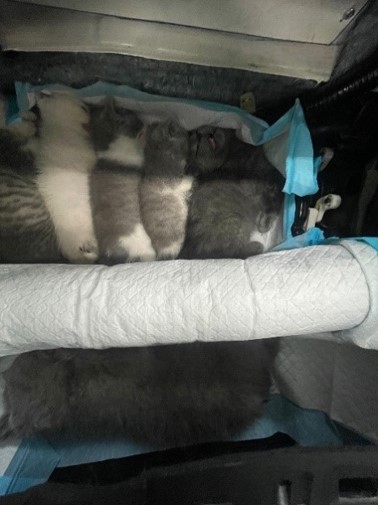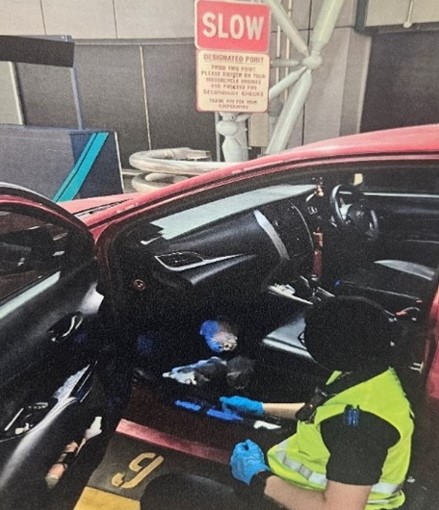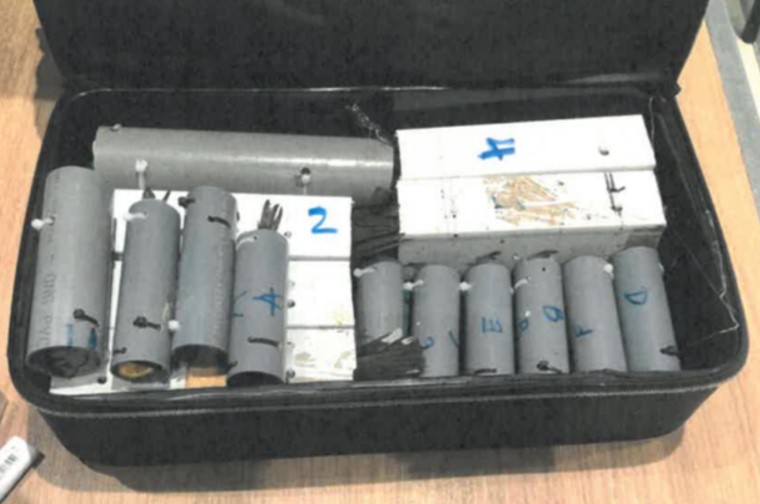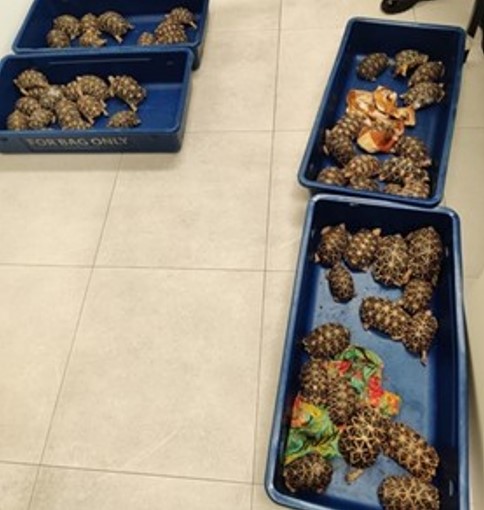42 Cases of Animal Smuggling, Involving Both Wildlife and Pets, Detected at Singapore’s Borders in 2024
- In 2025, eight cases of animal smuggling were detected between January and April
Singapore, 27 May 2025 – In 2024, 42 cases of animal smuggling, involving both wildlife and pets, were detected at Singapore’s borders in 2024 by the National Parks Board (NParks) and partner agencies such as the Immigration & Checkpoints Authority (ICA). Following detection, a man was charged and sentenced to 16 months’ imprisonment for the attempted smuggling of 58 Indian Star Tortoises when transiting through Singapore at Changi Airport in August 2024. These tortoises are a scheduled species under Appendix I of the Convention on International Trade in Endangered Species of Wild Fauna and Flora (CITES). Another man was sentenced to 20 weeks’ imprisonment for attempting to smuggle 16 live birds, including two scheduled bird species, through Changi Airport in August 2024. In another case, a man was sentenced to 32 weeks’ imprisonment for attempting to smuggle five puppies and two kittens, concealed within the rear passenger seat compartment of the vehicle through Tuas Checkpoint. All seven animals tested positive for Canine/Feline Parvovirus, thus exacerbating their suffering and three animals later passed away.
2. In 2025, eight of such cases were also detected between January and April. These cases included a variety of animals including dogs, cats and wildlife, including scheduled species under the Convention on International Trade in Endangered Species of Wild Fauna and Flora (CITES). These cases are under investigation.
3. NParks takes the smuggling and illegal trade of animals seriously and will not hesitate to take the necessary and appropriate enforcement action against offenders, regardless of the type and number of animals being smuggled. In addition to cases where the perpetrators were charged in court, there were also four pet smuggling cases detected in 2024 and 2025 where the offenders, which included potential pet owners, were issued fines.
4. NParks and ICA, together with partner agencies, will continue our surveillance and enforcement efforts to deter and detect smuggling and illegal trade of wildlife and pet animals. The public can play their part by not contributing to the demand for illegally imported animals, wildlife parts and products.
Adopting a zero-tolerance stance against animal smuggling
Animal smuggling attempts comprise animal health and welfare
5. The well-being of smuggled animals is often compromised by poor holding and transport conditions during the smuggling process. Animals are usually transported in cramped conditions with poor ventilation. In some cases, the animals are heavily sedated to minimise noise and movement to avoid detection by the authorities. This has resulted in poor health conditions, injuries, and even death of the smuggled animals.
6. For example, in May 2024, ICA officers detected an attempt by a man to illegally import eight animals (seven puppies and one kitten) concealed in a modified car boot compartment. The animals were subsequently sent to NParks’ Animal Quarantine Centre for microchipping, physical examinations, and quarantine. Unfortunately, six of the animals later died due to Canine Parvovirus. The man was sentenced to 44 weeks’ imprisonment.
7. NParks works closely with partner agencies such as ICA to cross-share information to aid in the detection of cases and carry out regular operations to coordinate efforts and enhance surveillance and deterrence against animal smugglers at our checkpoints. The efforts of ICA officers, who are trained to detect suspicious travellers and vehicles, coupled with the use of technology, have also contributed to the detection of more animal smuggling cases at the land checkpoints. ICA officers use mobile x-ray scanning machines like the Z Backscatter van to identify hidden modified compartments in cargo lorries, cars, and motorcycles. In addition, ICA leverages intelligence analysis to assist officers in identifying vehicles for checks, even when drivers and vehicles do not show signs of suspicious behaviour or other anomalies.
Combating illegal keeping and trade of wildlife
8. In addition to border surveillance, NParks also regularly monitors physical and online marketplaces and takes appropriate enforcement actions against perpetrators. Over the past two years, NParks has carried out island-wide operations on more than 30 premises resulting in the seizure of over 240 wildlife. These cases involved individuals who had advertised various wildlife species for sale through social media platforms such as Telegram. Many of the species that were being offered for sale are exotic wildlife species that are not allowed to be sold or offered for sale, or kept as pets in Singapore, including several species which are protected under CITES.
9. The Government takes a zero-tolerance stance on the illegal trade and import of pet animals and wildlife. For example, in one case, a man was sentenced to 8 weeks’ imprisonment in February 2024 for the illegal keeping of 69 wildlife at a farm at Neo Tiew. This included CITES Appendix II scheduled species such as African Spurred Tortoises (Centrochelys sulcata) and Argentinian Black and White Tegus (Salvator merianae).
10. Under the Animals and Birds Act, first-time offenders caught importing any animal or bird without a licence may be fined up to $10,000, jailed for up to 12 months, or both. The illegal trade of wildlife, including non-CITES species, is regulated under the amended Wildlife Act. Under the Wildlife Act, a person must not offer for sale, sell or export any wildlife (whether alive or dead), or any part of a wildlife, unless the person has the Director General’s written approval to do so. Any individual found to have violated the laws may be fined up to $50,000, jailed up to two years, or both.
11. Illegal wildlife trade threatens the survival of endangered species and contributes to habitat destruction around the world. Singapore is a signatory to Convention on International Trade in Endangered Species of Wild Fauna and Flora (CITES) and is committed to international efforts to combat illegal wildlife trade to ensure the long-term survival of these animals. Singapore adopts a whole of government, multi-pronged approach to enforce against illegal wildlife trade through working closely with other domestic law enforcement agencies, our international partners, as well as with civil society.
12. Under the Endangered Species (Import and Export) Act, the penalties for an individual, for the illegal import of any CITES Appendix I specimens such as rhino horns and Indian star tortoises, is a maximum fine and maximum imprisonment term up to $100,000 per specimen (not exceeding aggregate of $500,000 or the market value of all specimens at the material time, whichever is higher) and six years. For CITES Appendix II and III specimens such as reticulated pythons and agarwood, the maximum fine and maximum imprisonment term is $50,000 per specimen (not exceeding aggregate of $500,000 or the market value of all specimens at the material time, whichever is higher) and four years.
Public has a role to play in ensuring animal health and welfare, and public health
13. The smuggling and illegal trade of pets and wildlife compromises animal health and welfare and poses a threat to public health. NParks strongly encourages prospective pet owners to adopt their pets from animal welfare groups or to purchase their pets from licensed pet shops. They should not purchase pets from unlicensed sources (e.g. social media or online platforms) as the health status of these animals are unknown. Irresponsible buyers who go for cheaper alternatives to bypass Singapore’s biosecurity requirements (e.g. bringing in animals without the necessary vaccination certifications and serving quarantine), may be unwittingly introducing threats to public health. This is because these animals may also carry diseases that can infect other local animals as well as people who come into close contact with the animals, including the pet owners themselves and their family and friends. Furthermore, these animals may be smuggled and/or not be bred according to the standards of animal health and care which NParks imposes on licensed breeders and pet shops.
14. Pet owners, businesses and the public have a part to play and a shared responsibility to safeguard animal health and welfare, by not contributing to the demand for illegally imported animals. When the buying of illegally imported animals from unlicensed sources stops, the smuggling will cease.
15. Those with information on suspected poaching, smuggling or illegal trade of pet animals and wildlife can report them to NParks via our website at www.avs.gov.sg/feedback or call us via our Animal Response Centre at 1800-476-1600.
16. Safeguarding Singapore’s borders remains a top priority for ICA. ICA will continue to work with relevant authorities to detect and deter attempts to smuggle illegal goods and items through Singapore’s checkpoints.
IMMIGRATION & CHECKPOINTS AUTHORITY
NATIONAL PARKS BOARD
27 MAY 2025
Annex A – Notable examples of animal smuggling cases detected in 2024
| Date | Case details | Photos |
| May 2024 | On 7 May 2024, a man was stopped at Tuas Checkpoint and was found to be in possession of a live Asian Arowana (Scleropages formosus) that was recovered inside a motor vehicle belonging to him. Investigations revealed that the man had intended to import the Asian Arowana to deliver to a recipient in Singapore. The Asian Arowana was subsequently sent to NParks’ Animal Quarantine Centre for physical examinations and quarantine. It was further established that the man had imported Arowanas of different quantities into Singapore on at least 10 other occasions. The Asian Arowana (Scleropages formosus) is classified as an Appendix I species under the Convention on International Trade in Endangered Species of Wild Fauna and Flora, CITES. The man was sentenced to nine months’ imprisonment. |
Smuggled Arowana |
| May 2024 | On 23 May 2024, Immigration & Checkpoints Authority (ICA) officers at Woodlands Checkpoint conducted a routine inspection on a Malaysia-registered vehicle driven by a male Malaysian. During the inspection, they detected eight animals (seven puppies and one kitten) concealed in a modified car boot compartment. The animals were subsequently sent to NParks’ Animal Quarantine Centre for microchipping, physical examinations, and quarantine. Unfortunately, six of the animals later died due to Canine Parvovirus. The man was sentenced to 44 weeks’ imprisonment. |
Animals found in modified compartment of vehicle |
| June 2024 | On 4 June 2024, Immigration & Checkpoints Authority (ICA) officers at Tuas Checkpoint directed a Malaysian-registered vehicle driven by a male Malaysian for further checks. During the checks, ICA detected seven animals, consisting of five puppies and two kittens, concealed within the rear passenger seat compartment of the vehicle. The compartment was modified and split into two separate sub-compartments, an upper and lower one. All the animals tested positive for Canine / Feline Parvovirus, thus exacerbating their suffering and three animals later passed away. The man was sentenced to 32 weeks’ imprisonment. |
Rear seat compartment showing the cramped compartment the animals were hidden in |
| June 2024 | On 6 June 2024, Immigration & Checkpoints Authority (ICA) officers at Woodlands Checkpoint conducted a routine inspection on a Malaysia-registered vehicle driven by a male Malaysian. During the inspection, they detected six kittens concealed in a modified dashboard compartment. The animals were subsequently sent to NParks’ Animal Quarantine Centre for microchipping, physical examinations, and quarantine. The cramped and poorly ventilated conditions in which the animals were transported caused them significant discomfort and facilitated the transmission of Feline Parvovirus (FPV) among them. All the animals tested positive for FPV, a highly contagious virus that causes gastrointestinal disease in cats The man was sentenced to 18 weeks’ imprisonment. |
Animals found in modified dashboard compartment of vehicle |
| June 2024 | On 20 June 2024, Immigration & Checkpoints Authority (ICA) officers at Woodlands Checkpoint directed a Malaysia-registered vehicle driven by a female Malaysian for further checks. During the checks, ICA detected a female Malaysian passenger who was covered by a large black and white blanket with three live kittens roaming on the floorboard of the vehicle. The kittens were subsequently sent to NParks’ Animal Quarantine Centre for microchipping, physical examinations, and quarantine. Two of the kittens later died on 8 July 2024 due to Feline Parvovirus and Feline calicivirus. These viruses are highly contagious and typically cause anorexia, lethargy, vomiting and diarrhoea, resulting in rapid dehydration, sepsis and ultimately, death. Investigations further revealed that the women had carried out such smuggling operations using the same modus operandi on previous occasions. The female driver and passenger were sentenced to 30 weeks’ and 32 weeks’ imprisonment, respectively. |
ICA officer retrieving kittens from the vehicle |
| August 2024 | On 27 August 2024, at around 5:15 p.m., Immigration & Checkpoints Authority (ICA) officers at Changi Airport Terminal 4 conducted a routine inspection on the bags carried by a male Vietnamese. During the inspection, they detected 16 live birds concealed in the bottom compartment of a duffel bag. The birds included 9 Oriental White-eyes, 3 Red Whiskered Bulbuls, 2 White-rumped Shamas, and 2 Chinese Hwameis, were subsequently seized by NParks officers and brought to the Animal Quarantine Centre for health and welfare examinations. The birds were found to have been transported in cramped conditions with no access to food or water, resulting in significant discomfort and poor ventilation. Three of the birds subsequently died. The man was sentenced to 20 weeks’ imprisonment. |
Interior of bag containing the birds |
| August 2024 | On 29 August 2024, Immigration & Checkpoints Authority (ICA) officers at Changi Airport Terminal 2 conducted a routine inspection on a piece of personal luggage belonging to a male Indian citizen. During the inspection, they detected 58 Indian Star Tortoises concealed in the luggage. The tortoises were subsequently sent to NParks’ Centre for Wildlife Rehabilitation (CWR) for examination. The examination revealed that the tortoises were transported in conditions that caused them unnecessary suffering, including being packed in a soft case luggage with no ventilation openings and high stocking density. One tortoise was found dead, and 22 others were assessed to be thin while the remaining tortoises were found to be in slightly poor to acceptable health conditions The man was sentenced to 16 months’ imprisonment. |
Indian star tortoises that were hidden in the luggage |


